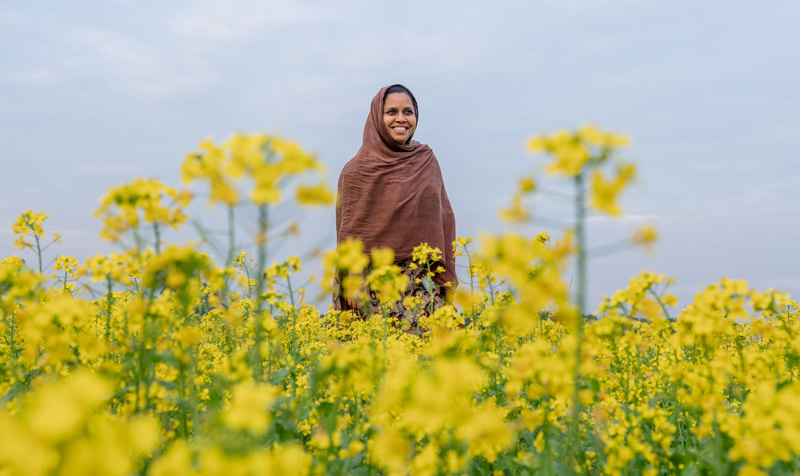By Rowshan Moni, ALRD and Beth Roberts, Landesa
On International Women’s Day this year, UN Secretary General Antonio Guterres issued a bleak assessment of progress toward gender equality, noting the world is 300 years away from winning equality for women and girls. Why is this the case? There are many reasons, but one stands out: the tie between land, patriarchy, and power is centuries old, and cinched tight. Globally, land—and the wealth and power it generates—is primarily owned and controlled by men.
Violations of women’s land and inheritance rights too often go unrecognized. This discrimination is normalized by social custom in approximately half the world, and it takes place in private, among families and within households. While we must end all forms of discrimination, this particularly pernicious denial of women’s rights and economic opportunity forms a foundation for many other violations, from child marriage to dispossession of widows.
The world cannot wait three centuries for women to be treated as equals. Gender discrimination is the most urgent human rights issue of our time, undermining efforts to accelerate climate action, alleviate poverty, promote food security, and fully realize rights for women and girls. Our collective response to climate change hangs in the balance. We cannot effect meaningful climate action if half the population lack the equal rights and access to resources necessary to become agents of change.
Breaking the bias
It doesn’t have to be this way. In a rural village in Faridpur District, Bangladesh, a short distance from the capital of Dhaka, one family chose equality for a daughter’s right to land.
Monoara Begum is a divorced mother of two, who left an abusive marriage – and with it, her home and access to land to earn a living. In that moment, her father made a choice to give her a piece of family land to build a home, and another plot of farmland.
The decision defied social norms in Bangladesh that favor men in land and inheritance rights. When asked about his decision, Monoara’s father laughed at the idea that he had gone against social customs and insisted that his daughter should have her right to land. It was an inspiring choice, and a surprising one in a country where less than 5 percent of land in Bangladesh is held by women, despite the fact that women constitute nearly 3 out of every 4 of the country’s farmers.
Collective advocacy for gender equality
Stand for Her Land (S4HL), the global women’s land rights campaign, works to ensure more stories play out like Monoara’s. In Bangladesh, S4HL engages in collective advocacy to address discrimination around women’s land rights, at both legal and social levels.
The S4HL Bangladesh Coalition of women-led grassroots organizations, coordinated by the Association for Land Reform and Development (ALRD), works together to change the legal and cultural climate so more women can own, access, and inherit land. The Coalition advocates for gender-inclusive policy around land at the national level while simultaneously conducting social norms and behavior change activities across the country to ensure implementation of land laws is free from gender discrimination.
Melding global and local action
Bangladesh is just one of many countries where gender discrimination is pervasive when it comes to inheriting land. Globally, 41 economies prevent daughters from inheriting property in the same way as sons, and 43 differentiate between male and female surviving spouses.
Stand for Her Land’s unique structure of melding global and local action means Coalitions across the world work in tandem from their unique contexts. Stand for Her Land’s Tanzania Coalition breaks down barriers to justice so more women can defend their legal rights to land.
Stand for Her Land Tanzania joined forces with Sheria Kiganjani (“Law On Your Palm”) to create a mobile application segment offering direct legal services from a cell phone. Through this innovative use of technology, more women in rural areas can learn about and defend their land and inheritance rights—driving gender equality from the ground up.
A sustainable future through women’s leadership
Climate change, conflict, and food insecurity loom in a world where gender inequality lingers. With women’s equal leadership, with men and women serving alongside each other as allies for a just and sustainable world, the future is far more hopeful. Equal inheritance rights are a path toward achieving this equitable, hopeful future; they are positively associated with higher levels of women’s entrepreneurship and can lead to economic empowerment. And equal inheritance rights are a matter of gender justice.
We have crossed the halfway point of the 2030 Sustainable Development Agenda and its ambitious goals to end poverty and achieve equal rights for women and girls. Under the Generation Equality Forum, the global community has made a commitment to accelerate gender equality, including securing women’s land and inheritance rights. It’s time for governments, development partners, and civil society to make the needed investment in women’s land rights as an equitable foundation for a sustainable future.
We don’t need to wait 300 more years. We can achieve transformative change now.

